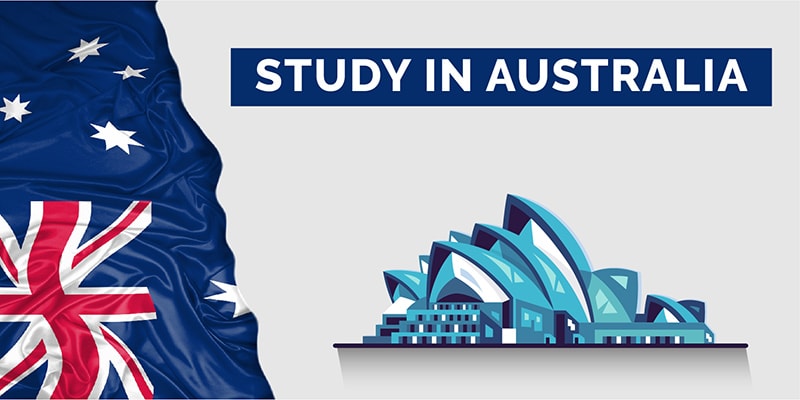Australia has become a leading destination for international students, offering an exceptional blend of world-class education, cultural diversity, and a safe environment. With its globally recognized universities, innovative teaching methods, and cutting-edge research facilities, Australia equips students with the skills and knowledge needed for a competitive global workforce. Beyond academics, the country’s welcoming atmosphere, multicultural society, and vibrant cities like Sydney, Melbourne, and Brisbane make it an ideal choice for students seeking a well-rounded experience.
This comprehensive guide will help you navigate the study in Australia journey, covering essential aspects such as the education system, financial requirements, top institutions, and government support. Whether you’re planning to study in Australia from Nepal or another part of the world, this blog provides valuable insights into what makes the country a top choice for education abroad. From understanding tuition costs to exploring scholarship opportunities, you’ll find everything you need to kickstart your academic adventure in Australia.
Why Study in Australia?
When considering options for higher education, you might wonder, why study in Australia? Here’s what makes it unique:
- Global Recognition: Australian universities consistently rank among the world’s best, known for their high academic standards and research outputs.
- Innovative Education System: With modern teaching methods and a focus on practical skills, Australia equips students with industry-ready knowledge.
- Multicultural Environment: Australia is a melting pot of cultures, offering a welcoming atmosphere for international students.
- Post-Study Work Opportunities: Graduates can apply for post-study work visas to gain valuable work experience.
- High Quality of Life: Australian cities like Sydney, Melbourne, and Brisbane rank high for livability, ensuring a balanced lifestyle for students.
How to Choose the Right University
Selecting the right institution is crucial for a successful academic journey. International students often base their decisions on the following:
- Course Availability: Ensure the university offers your desired course. For example, if you’re interested in development studies in Australia, verify the program’s curriculum aligns with your goals.
- University Rankings: Check global rankings like QS and Times Higher Education to assess the reputation of institutions.
- Location: Consider lifestyle, employment opportunities, and climate in cities such as Sydney, Brisbane, or Perth.
- Student Support Services: Look for services like academic counseling, language assistance, and career support.
- Scholarships: Research financial aid options to reduce the total cost to study in Australia from Nepal or other countries.
Application Process for Nepali Students
For those planning to study in Australia from Nepal, here’s a step-by-step guide:
- Research Universities: Identify institutions offering programs that match your interests.
- Prepare Documents: Gather academic transcripts, English proficiency scores (IELTS/PTE), SOP, and recommendation letters.
- Apply Online: Submit your application through the university portal.
- Offer Letter: Review and accept the university’s offer letter.
- Student Visa: Apply for a subclass 500 student visa, providing financial proof, a Genuine Student (GS) requirement statement, and your Confirmation of Enrollment (COE).
How Much Money is Required to Study in Australia?
A common question among students is, how much money is required to study in Australia? Here’s a breakdown:
- Tuition Fees:
- Bachelor’s Degree: AUD 20,000–45,000 per year.
- Master’s Degree: AUD 22,000–50,000 per year.
- Vocational Training: AUD 10,000–20,000 per year.
- Living Costs:
- Accommodation: AUD 1,000–1,500/month.
- Food and Groceries: AUD 300–600/month.
- Transportation: AUD 150–300/month.
- Health Insurance (OSHC): Mandatory for all students, costing AUD 500–700 annually.
For Nepali students, the total cost to study in Australia from Nepal includes airfare, visa fees, and other expenses, adding up to AUD 30,000–50,000 annually.
Scholarships for International Students
Wondering how can I get scholarship to study in Australia? Here are some options:
- Australia Awards: Fully funded scholarships for students from developing countries, including Nepal.
- University Scholarships: Merit-based scholarships like the University of Sydney International Scholarship and Monash International Merit Scholarship.
- Private Scholarships: Non-government organizations and private entities also offer scholarships.
Scholarships help reduce the total cost to study in Australia from Nepal, making education accessible for many.
What GPA is Required to Study in Australia?
Universities in Australia typically require the following GPA:
- Undergraduate: Minimum 2.5 on a 4.0 scale.
- Postgraduate: Minimum 3.0 on a 4.0 scale.
Along with GPA, English proficiency tests like IELTS or PTE are mandatory for non-native speakers.
What to Pack When Studying Abroad in Australia
Here’s a checklist for what to pack when studying abroad in Australia:
- Documents: Passport, visa, COE, academic records, and health insurance.
- Clothing: Seasonal clothes suitable for Australia’s varied climate.
- Electronics: Laptops, chargers, and adapters.
- Personal Items: Photos, medicines, and cultural items.
Part-Time Work Opportunities
International students in Australia can work up to 20 hours per week during the semester and full-time during holidays. Popular part-time roles include:
- Retail and hospitality jobs.
- Administrative work.
- Tutoring or freelance gigs.
These jobs help cover living costs while offering valuable work experience.
Is Australia Safer than the USA?
Many students find Australia safer than the USA due to its:
- Low crime rates.
- Stringent gun control laws.
- Well-regulated healthcare and education systems.
However, safety varies by city, so always research your chosen location.
Post-Study Work Opportunities
Graduates can apply for a Temporary Graduate Visa (subclass 485), allowing them to work in Australia for 2–4 years based on their qualification level. This provides international students with opportunities to gain professional experience.
Top Universities in Australia
Australia is home to prestigious universities such as:

- University of Melbourne.
- Australian National University (ANU).
- University of Sydney.
- University of Queensland.
- University of New South Wales (UNSW).
Also know about:Top Universities in Nepal
Conclusion
Australia provides international students with an exceptional mix of academic excellence, cultural diversity, and extensive post-graduation opportunities. Home to some of the world’s top universities, the country offers innovative programs and globally recognized degrees that prepare students for success in their careers. Beyond the classroom, Australia’s vibrant multicultural environment fosters personal growth, while its safe and inclusive society ensures a supportive experience for all.
Whether you’re planning to study in Australia from Nepal or any other part of the world, choosing Australia is an investment in your future. It offers invaluable opportunities to develop skills, gain international exposure, and build a solid foundation for career advancement. With world-class education and access to post-study work options, Australia empowers you to achieve your dreams. Start planning your life-changing educational journey today!

